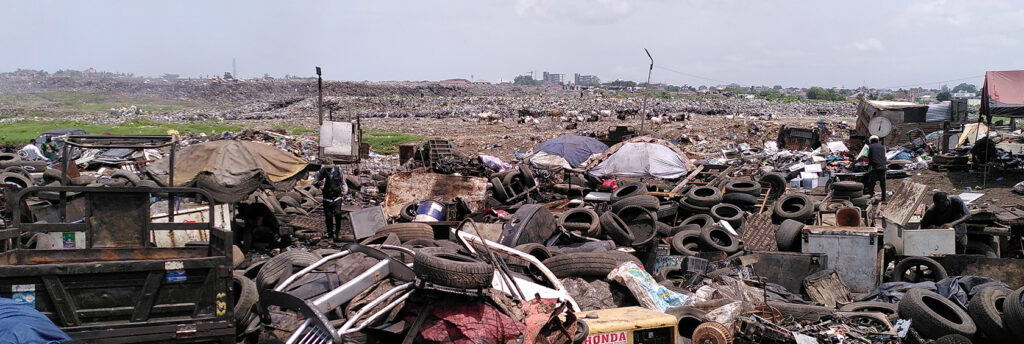
E-waste Recycling: The Good, The Bad and The Ugly
E-waste is the fastest growing waste stream globally. In 2022, a record amount of 62 megatons of e-waste was generated, with little to no information on how 78% of this is collected and recycled. The amount of e-waste generated annually is growing five times faster than the amount that is responsibly collected and recycled every year. By 2030, e-waste generation is expected to reach 82 megatons.
Recycling is seen as the panacea to deal with this growing waste stream. This is also reflected in the trend of industry peers that include the use of recycled materials as responsible sourcing strategies. A benefit of recycled material is that it often uses less CO2 than virgin mined material. However, the supply chain of recycled material can also include pressing social and environmental risks.
As it stands, improper management of e-waste releases a variety of harmful contaminants into the environment every year, from mercury to plastics. Hazardous dismantling practices pose various health risks to waste workers, ranging from cuts and wounds to potentially fatal chemical poisoning. That’s not to mention the child labor involved, which is unfortunately a common occurrence in informal e-waste supply chains. As per our sources on the ground in Ghana, child labor comprises anywhere between one to 15% of the total workforce involved in informal waste picking in the country.
Is Europe better when it comes to e-waste management?
Europe generates the highest amount of e-waste per person, with an average of 17.6 kg for every resident in the continent. In the EU, companies are required by law to pay e-waste fees in relation to the products they put on the market. This should theoretically finance the responsible collection and recycling of their products. Unfortunately, this isn’t solving the problem. Europe may have the highest formal collection and recycling rates in the world on paper. However, that isn’t something to be proud of when we don’t know how 60% of the continent’s generated e-waste is collected and recycled, if at all.
So where does the remaining 60% go?
The data is inconclusive on this. But we know that electronics often get a second life in low and middle income countries where users can’t afford new devices. This is a good thing because the reuse of these products increases their product lifetime, and leads to less demand for raw materials and less CO2 emissions. However, as the remaining lifetime of second-hand electronics is shorter, these countries then have to deal with relatively higher amounts of e-waste compared to electronics users in the EU.
The problem becomes even more complex, given that these countries don’t have the infrastructure to responsibly recycle the toxic e-waste. Almost 30% of the global e-waste generated in 2022 was recycled by the informal sector in these countries, representing 18 megatons of e-waste.
Ironically, the companies that make these products don’t contribute to responsible collection and recycling practices here at all. This needs to change. It is high time companies across the industry actively invest in responsible recycling efforts in the countries where their products actually reach their end of life.
So how do we do this? Are informal waste pickers the problem?
Wrong. We need to acknowledge the essential role small scale recycling plays, not just for global material recovery, but from a human development perspective.
As per a WHO report in 2021, between 12.5 and 56 million people are dependent on informal recycling globally. Often, small scale recycling provides a livelihood in areas where people have very little alternative economic opportunities. Moreover, waste pickers contribute to circularity and material recovery, where formal collection and recycling levels are almost non-existent. For instance, in Ghana, 95% of e-waste gets informally collected where formal collection is less than 1%.
Helping informal waste pickers do their job safer and earn a decent living from it is the fair thing to do. That’s why we are happy to announce that over the next four years, Fairphone (along with our e-waste compensation partner, Argo360) will be tying up with the Greater Accra Scrap Dealer Association and Green Advocacy Ghana to do just that by:
- Increasing incomes: Waste pickers in Ghana earn less than 40% of a living income. This means that waste pickers’ incomes are insufficient to cover their family’s basic needs like food, housing, clothing, education or health care. This poses major social risks, including the occurrence of child labor.
- Improving working conditions: E-waste compensations ensure that the most hazardous job of dismantling e-waste is done responsibly. However, going forward, we also want to improve conditions for the waste pickers who collect, transport and store the e-waste, before it gets to our e-waste compensation partner.
- Build local recycling capacity: By partnering with recycling companies and improving their practices, more e-waste can be responsibly recycled within the country, reducing the need to transport e-waste to Europe for responsible recycling. This will help create more jobs and more income locally, boosting the local economy.
(This project is supported by the Social Sustainability Fund, as part of The Netherlands Enterprise Agency (RVO) and in commission of the Dutch Ministry of Foreign Affairs.)
Fairphone already combats e-waste by making sure all our flagship products are e-waste neutral products. That’s also why we heavily promote our Reuse and Recycling program, and partner with e-waste races wherever possible. Through our e-waste compensations, we ensure hazardous e-waste is collected, dismantled and recycled responsibly. With this latest partnership, we are stepping up for the informal waste picking community. The question is, how many other tech brands are willing to do the same?
Share this post
The post you are currently reading is an AMP HTML document; an optimized version for mobile usage to increase loading speed and decrease data usage. To see our full website you can visit our own mobile version of this post.